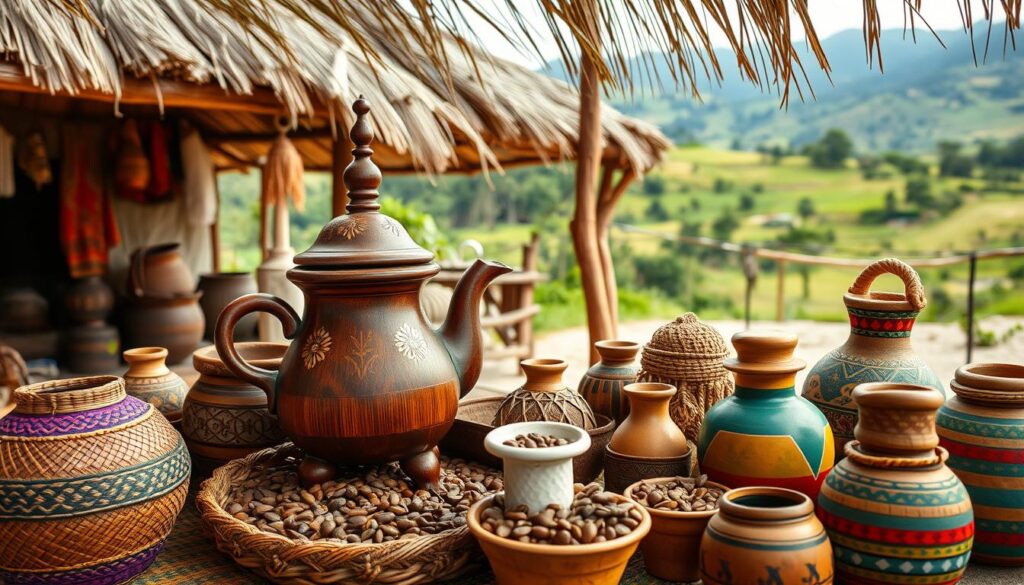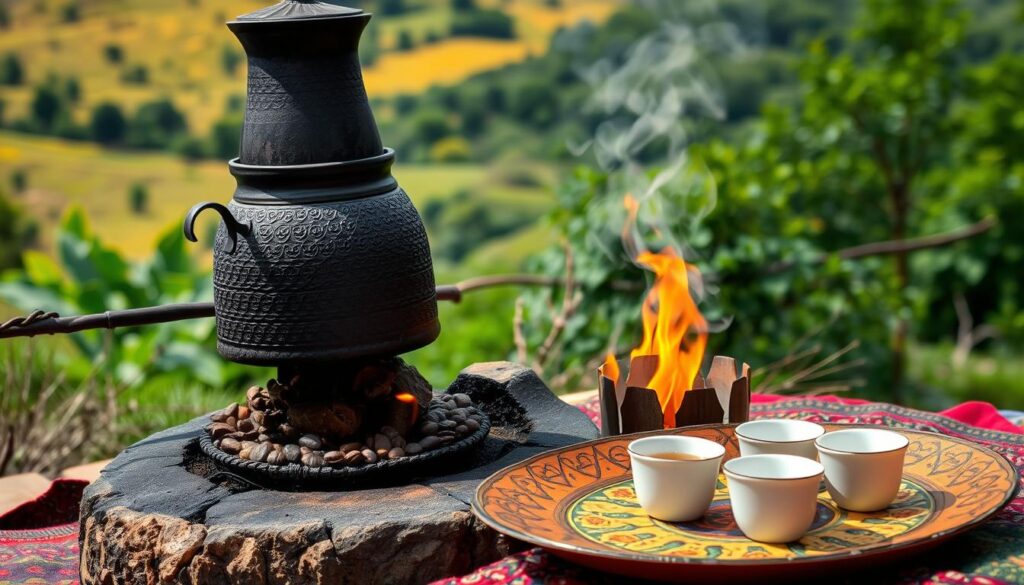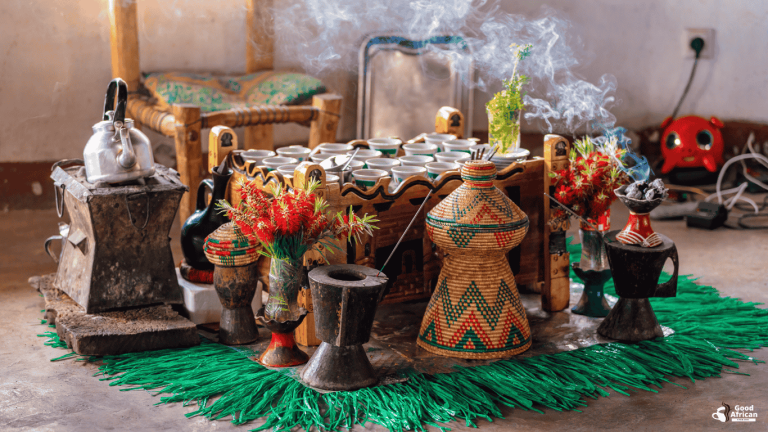Imagine walking into a quiet Ethiopian village. The air is filled with the scent of freshly brewed coffee. This is what the Ethiopian coffee experience is all about. It’s a tradition that is a big part of the nation’s culture.
In Ethiopia, drinking coffee is a group activity. It’s a time to come together, talk, and enjoy the moment. This is different from the solo coffee rituals found in the West.
The phrase “buna tetu” in Ethiopia means more than just drinking coffee. It’s about the whole social experience. It’s a ritual that brings people together to share, connect, and enjoy the country’s favorite drink.
With Ethiopia drinking more than half of its coffee, it’s not just a morning boost. It’s a cherished part of daily life.
Key Takeaways
- Ethiopian coffee is deeply rooted in the country’s culture and society, with a communal drinking experience.
- Ethiopia consumes more than half of its coffee production, considering it the national drink and a staple.
- The traditional brewing method uses a clay pot called a jebena, and the coffee is served in identical handle-less demitasse cups to everyone.
- Coffee remains an essential part of social gatherings in the Kafa region, with every invitation including a serving of coffee.
- Traditional coffee companions in Kafa include savory snacks like popcorn and puffed barley.
Ethiopian Coffee Culture
Coffee is very important in Ethiopian society, mainly in the Kafa region. Over 85% of the people there depend on it for their living. The coffee culture in Ethiopia is rich and has deep roots in traditions and rituals.
The Importance of Coffee in Ethiopian Society
The Ethiopian coffee ceremony is a beloved tradition. It brings people together, creating strong social bonds. Coffee is a shared experience, not just a drink. It encourages conversation, relaxation, and strengthens relationships.
Coffee as a Social Ritual
The traditional Ethiopian coffee rituals are complex and full of meaning. The ceremony includes roasting, grinding, and brewing coffee beans in a terracotta jebena pot. The smell of freshly roasted coffee signals the start of a gathering.
Traditional Coffee Ceremony Overview
- Roasting the coffee beans over an open flame
- Grinding the roasted beans using a mortar and pestle
- Brewing the ground coffee in a traditional jebena pot
- Serving the coffee in small, handleless cups
- Offering incense and traditional snacks, such as popcorn or puffed barley
The ceremony shows the deep bond Ethiopians have with their coffee culture. Being invited to a coffee ceremony means you’ll get to enjoy this special drink. It’s a custom to accept and join in this social ritual.

“Coffee is the common man’s gold, and like gold, it brings to every person the feeling of luxury and nobility.”
– Sheik Abd-al-Kadir
Traditional Brewing Methods of Ethiopian Coffee
Exploring Ethiopian coffee brewing is a fascinating journey for coffee lovers. At its core is the jebena, a clay pot that’s been key in Ethiopian coffee making for ages. Brewing Ethiopian coffee with a jebena showcases the country’s rich coffee culture.
Choosing the Right Coffee Beans
Choosing the right beans is the first step to a great Ethiopian coffee experience. Ethiopian coffee beans are known for their complex flavors, from bright and fruity to earthy and chocolatey. Opt for specialty-grade Ethiopian coffee that’s been roasted dark and bold.
Step-by-Step Brewing Process
The traditional Ethiopian coffee brewing method is a multi-step process. It brings out the unique flavors of the beans. First, the beans are roasted over charcoal, developing their aroma and flavor. Then, they’re ground with a mortar and pestle into a fine powder.
- Add the ground coffee to the jebena, a clay pot designed to balance perfectly on a stovetop or open flame.
- Pour in just enough water to saturate the coffee grounds, allowing them to “bloom” for about 30 seconds.
- Gradually add more hot water, bringing the mixture to a gentle simmer. Allow the coffee to brew for 3-5 minutes, stirring occasionally.
- Carefully pour the freshly brewed coffee into small cups, ensuring the grounds remain in the jebena.
Essential Equipment for Brewing
To fully immerse yourself in the traditional Ethiopian coffee experience, you’ll need a few key pieces of equipment:
- Jebena: the iconic clay coffee pot
- Roasting pan: for pan-roasting the coffee beans
- Mortar and pestle: to grind the freshly roasted beans
- Small serving cups: the traditional way to enjoy the brewed coffee
Mastering Ethiopian coffee brewing may take some practice, but the rewards are exceptional. The unique flavors and aromas of this tradition will take you to the heart of Ethiopia’s vibrant coffee culture.

Enjoying Your Ethiopian Coffee Experience
To fully enjoy Ethiopian coffee, dive into the communal side of the ritual. Drink it black or with a bit of sugar, honey, salt, or butter. This lets the coffee’s complex flavors stand out. Try it with traditional snacks like popcorn and puffed barley for a perfect match.
Best Practices for Drinking Ethiopian Coffee
When drinking Ethiopian coffee, take your time to enjoy the flavors and aromas. Don’t rush; let the coffee stay on your tongue. This way, you can really taste its unique notes. Also, notice the coffee’s smell and look as you drink it.
Pairing Ethiopian Coffee with Traditional Snacks
Pairing Ethiopian coffee with traditional snacks can make your experience even better. The rich Sidamo coffee goes well with puffed barley, mixing textures and tastes. On the other hand, the bright Yirgacheffe coffee pairs well with popcorn, creating a perfect balance.
Tips for Hosting Your Own Coffee Ceremony
Hosting an Ethiopian coffee ceremony is all about the social aspect. Invite friends and family to join you. Make sure there’s time for talking, sharing stories, and bonding. The ceremony’s ritual and the scent of incense add to the community feeling.







